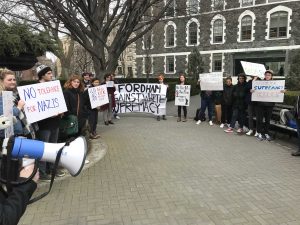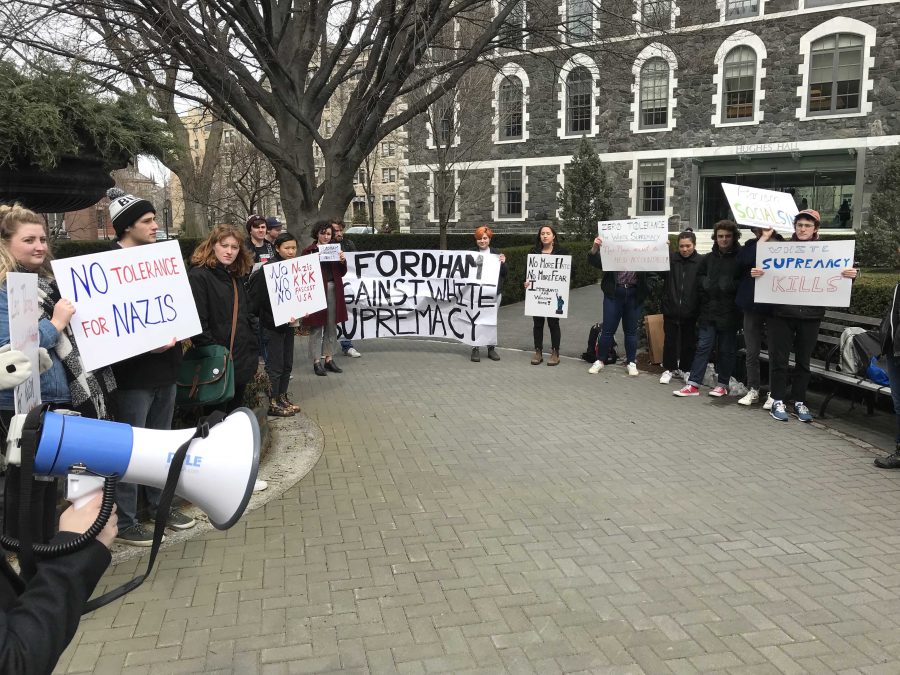Students Protest White Supremacy at Fordham
Students chanted slogans such as "No Nazis, No KKK, No Fascist USA" to protest incidents of hate speech on Fordham's campus. (Courtesy of Kevin Stoltenborg)
March 14, 2018
By Joergen Ostensen

Students gathered at the Carolyn Dursi Cunniffe Fountain on Monday afternoon to protest white supremacy at Fordham and what they considered to be a lack of a condemnation by the administration and unfair resolutions to incidents of hate speech on campus.
Fordham Students United (FSU) organized the protest and around 20 students attended. During the hour and a half event, there was near constant use of a megaphone for speeches and chants.
Protesters said the impetus for the protest included the Rodrigues Coffee House incident and the photo of Fordham students posing with a Kekistan flag on Murphy Field.
In an email advertising the protest, FSU said it felt the university protected students who used hurtful rhetoric.
“Fordham’s response, or lack thereof, to these events shows that the only free speech Fordham is willing to protect is the violent and racist rhetoric that actively targets and threatens students of color, LGBTQ+ folks, immigrants, Muslims, Jews and other minority groups,” the email said.
Students held signs and banners with slogans denouncing white supremacy. Slogans included messages such as “Black Lives Matter” and “Racism is a Social Sin.” Others read “No Tolerance for Nazis” and “White Supremacy Kills.” Students held a banner that said, “Fordham Against White Supremacy.”
Chants were also a constant presence at the protest. Protesters used a variety of slogans including: “Say it loud, say it clear, Nazis are not welcome here,” “Hate speech is not free speech” and “No Justice, No Peace.”
Several of the protestors also voiced their opinions on issues using the megaphone.
Rebecca Erwin, FCRH ’18, a member of FSU and one of the event’s organizers, explicitly connected Fordham’s administration to the issue.
“Fordham’s policies and protection of white supremacy is putting people at risk,” they said.
Erwin said they felt not enough members of the Fordham community are addressing white supremacy.
“Our goal today was just to spread the word,” they said. “A lot of people just don’t know what’s going on.”
Reyna Wang, FCRH ’18, a member of FSU, said part of the goal was to inspire administrative response. She said the university was unfair in its response to both the Rodrigues Coffee House incident and the Kekistan Flag photo, which she said she considers to be connected to white supremacy.
“We just want to call on the school to directly address that there is a problem of white supremacy on campus, to denounce it and to hold the people who are propagating this message accountable,” she said.
Wang said there is a connection between inaction on this issue and potential violent acts.
“If you connect the dots, you see the reason that people are physically harmed by white supremacy is because people allow this message to spread,” she said.
Jonah Foley, FCRH ’18, of FSU also said white supremacy poses a real threat to students on Fordham’s campus.
“I’m literally scared,” they said. “This place isn’t really safe for me anymore…as a person who is out as trans now and as a person who is vocal about these kinds of issues.”
Bob Howe, director of communications for the university, said the university is committed to the safety of its students and works to create an environment where students feel safe.
Claire del Sorbo, FCRH ’19, said that although she, as a white student, does not feel threatened she has noticed a very hostile environment toward students of color.
“I’ve seen the way that it’s affected my friends,” she said.
The protesters were critical of Fordham’s response to this issue, which was why the protest took place near Cunnife House.
Del Sorbo said the priorities of the university are misplaced.
“It’s unacceptable that these students have not been openly condemned by the university and that the university has not openly condemned white supremacy and has treated student activists, like us, as a bigger threat to the university,” she said.
She said that inaction is not in accordance with Jesuit values, which she said the university only gives the appearance of upholding.
“They don’t defend their most marginalized students and even defend the people who caused harm to them,” she said. “They protect them because their parents donate a lot of money to the university.”
Howe said the university takes action in cases of hate speech on campus.
“The University does take action when hate speech occurs on campus, and did so in the case of the flag, but since it was handled through the student disciplinary process, the outcome must remain confidential,” he said.
Rafael Zapata, who began as Fordham’s chief diversity officer this semester, attended the protest. Zapata declined to comment for The Ram.
Erwin said they considered his presence at the event to be significant and said they have high hopes for him in his new role. However, Erwin said the optimism his presence gave here did not extend to the rest of the administration.
“I don’t think it speaks for the administration at all,” they said.
Erwin said they do not have faith that Zapata will be able to change university policies.
“[The administration] supported talking about these issues without taking any action,” they said. “A lot of the time, I feel like the administration likes to pretend they care.”
Erwin also said they were concerned that Zapata was the only member of the administration to attend the event. They specifically criticized Joseph M. McShane, S.J., president of the university, for not showing up.
“McShane never shows up for these things,” they said. “That says to me that he doesn’t care.”
Howe said though McShane’s schedule generally precludes him from attending events held on short notice, he is fully aware of and empathetic to the students’ concerns, and supports Student Affairs in addressing any unease and/or threats as fully as possible.
“As much as Father McShane and the administration would like to protect the University community from hate speech, we are not insulated from the culture around us, a culture that is increasingly divisive and in some cases openly hateful,” he said.
Howe said the administration is committed to an inclusive campus.
Erwin said they noticed other students mocking the protest and found it concerning, as they feel it is representative of a trend in the student body.
“I notice stuff like that all the time, people mocking protests and not understanding why people care about this because there is a culture of apathy at Fordham University,” they said
Wang was also critical of students and administrators who were not present at the protest.
“If you’re not actively opposing white supremacy, if you’re not opposing racism, you’re taking the side of the oppressor,” she said. “That’s the side our administration is taking.”
Editor’s Note: This article has been updated as new information came to light.


If you want a picture to show with your comment, go get a gravatar.